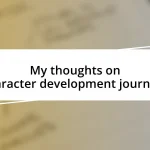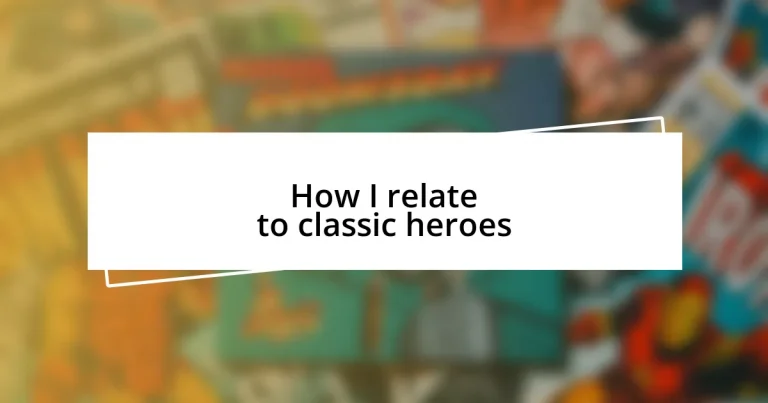Key takeaways:
- Classic heroes inspire reflection on personal bravery, resilience, and moral dilemmas in our own lives.
- Emulating hero traits such as selflessness and moral complexity can transform how we approach challenges and relationships.
- Daily acts of bravery can manifest through kindness, standing up for values, and being present for others.
- Personal growth often emerges from confronting vulnerabilities and learning from challenges, reinforcing that heroism is a journey.
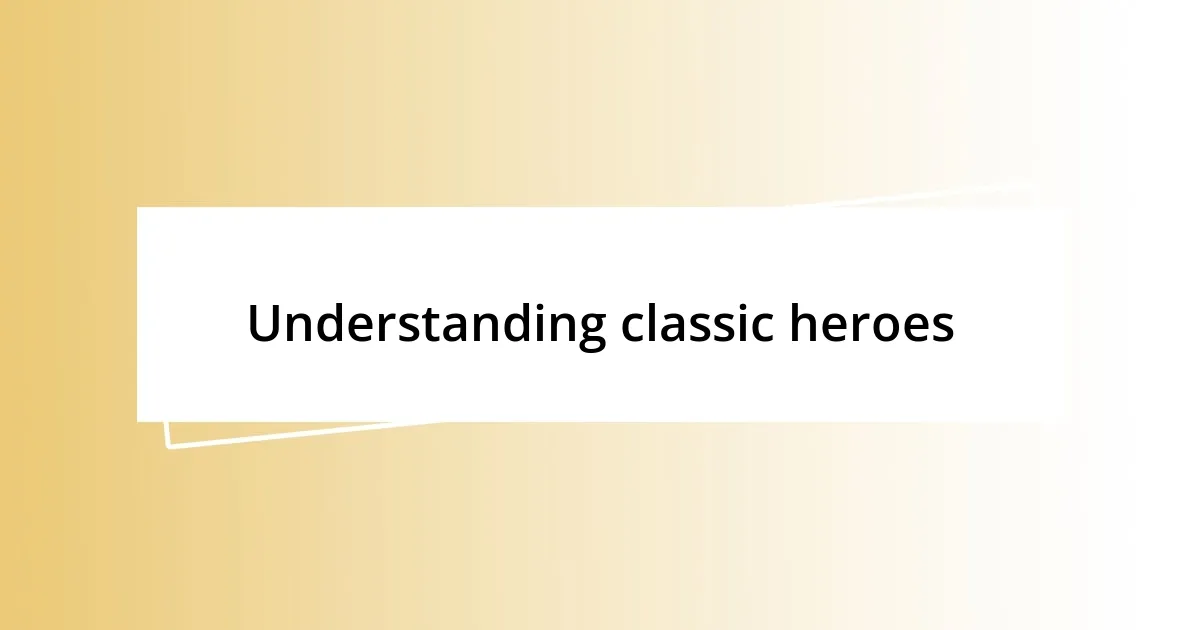
Understanding classic heroes
Classic heroes have always fascinated me because they embody traits that resonate deeply with our human experience. Think about characters like Odysseus or Hercules; they face tremendous barriers but demonstrate resilience and bravery. Isn’t it inspiring to see how they navigate their journeys, reflecting our own struggles and hopes?
When I first encountered Beowulf, I was struck by his unwavering commitment to protect his people, even at great personal risk. This made me reflect on moments in my own life where I’ve felt compelled to step up for friends or family, no matter the cost. Can you remember a time when you felt that pull to be a hero in someone else’s story?
Understanding classic heroes isn’t just about recognizing their physical strength or cunning intellect; it’s about acknowledging their vulnerabilities and moral dilemmas. Their journeys prompt us to ask ourselves—what does it mean to be courageous in our own lives? For instance, when I think of Atticus Finch from “To Kill a Mockingbird,” I see a man standing up for justice in the face of overwhelming adversity. It’s a reminder that being a hero often means making tough choices when the easy path is right in front of us.
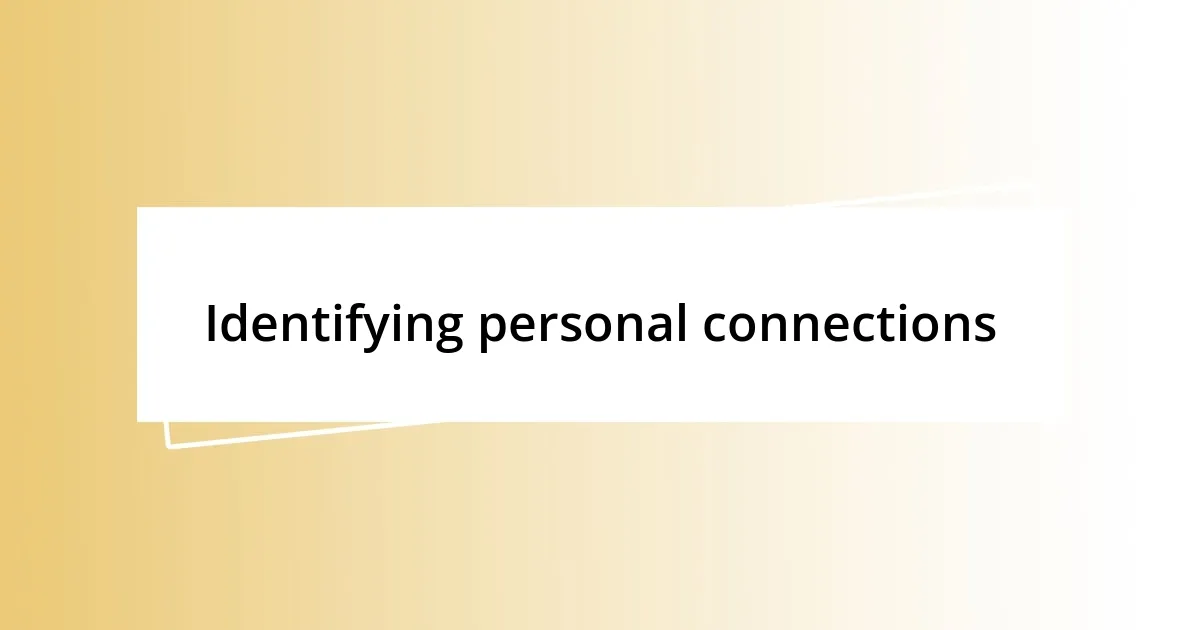
Identifying personal connections
Identifying personal connections often starts with recognizing the traits of these heroes that resonate with our own life experiences. I recall a time when I had to confront a difficult situation at work, much like when Frodo faced his daunting journey in “The Lord of the Rings.” I felt small and overwhelmed, but remembering Frodo’s bravery inspired me to keep moving forward, even when the path seemed uncertain.
- Reflect on challenges you’ve encountered that mirror those of classic heroes.
- Think about qualities you admire in these characters and how they relate to your own values.
- Consider moments in your life where you’ve had to make difficult choices, just as they have.
- Identify heroes who have influenced your perspective on bravery and resilience.
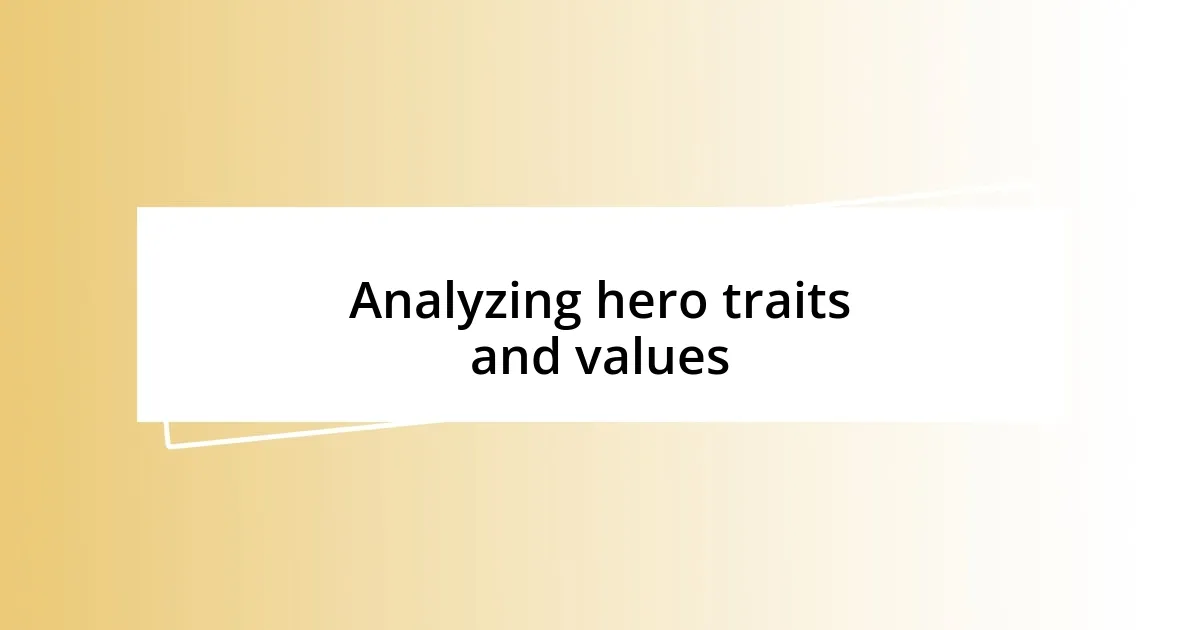
Analyzing hero traits and values
Analyzing hero traits and values is fascinating because it reveals how deeply these characters resonate with what we aspire to be. I often find myself drawn to their selflessness and unwavering resolve, traits I strive to embody in my own life. For example, when I think of Spider-Man, I’m reminded of his motto: “With great power comes great responsibility.” This principle pushes me to take action—whether volunteering in my community or supporting friends in need—because I believe it’s essential to use my ability to make a positive impact.
In my opinion, the most compelling heroes often grapple with conflicting values. Take Batman, for instance; he operates outside the law, driven by a profound sense of justice. This complexity resonates with me since I sometimes struggle between upholding my personal ethics and adhering to societal norms. It reinforces the notion that heroism is not always straightforward; it’s often the choices that challenge our moral compass that define true courage.
I think one of the biggest takeaways from analyzing hero traits is their relatable imperfections. For instance, consider Achilles from “The Iliad.” Despite his strength, he experiences moments of vulnerability and anger. This reminds me of my own life, especially when I face setbacks and feel frustrated. Understanding that even heroes have flaws makes them more relatable and inspires me to embrace my own vulnerabilities as part of the journey toward becoming a better version of myself.
| Hero | Traits |
|---|---|
| Spider-Man | Selflessness, Responsibility |
| Batman | Justice, Moral Complexity |
| Achilles | Strength, Vulnerability |
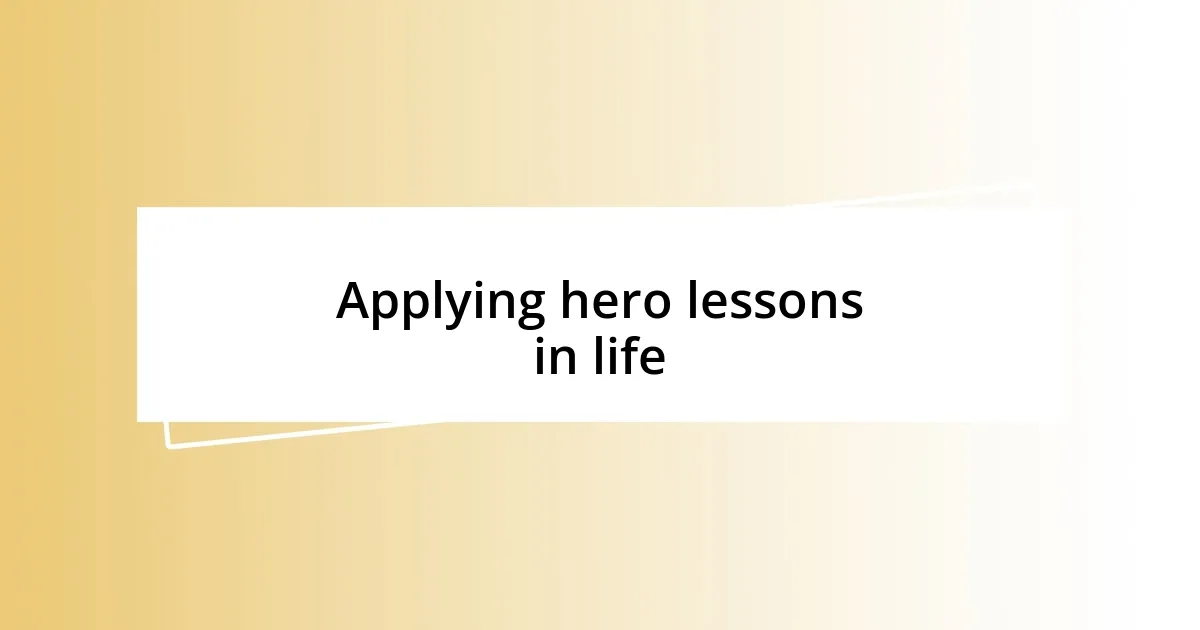
Applying hero lessons in life
Applying the lessons learned from classic heroes in our lives can be incredibly transformative. For instance, I often think about how the resilience of heroes like Katniss Everdeen from “The Hunger Games” encourages me to stand up for what I believe. I remember a moment where I had to advocate for an important project at work, despite pushback from my team. Channeling Katniss’s courage helped me voice my ideas, even when it felt uncomfortable, and I realized that sometimes, being a hero in our own narrative means simply having the courage to speak out.
Another powerful lesson comes from heroes who embrace change. I learned this from the story of Harry Potter, who constantly navigates through realms of uncertainty and growth. There have been times in my life where I felt stuck, unsure of my next steps, similar to Harry facing daunting challenges at Hogwarts. Embracing change has taught me that growth often comes from discomfort and a willingness to venture into the unknown. It’s a reminder that just like Harry, I must be ready to step outside my comfort zone to discover who I truly am.
This not only applies to our personal journeys but also to our relationships with others. I find that the empathy and compassion displayed by characters like Atticus Finch in “To Kill a Mockingbird” resonate deeply with my values. There was a situation where a friend was dealing with a tough family issue, and rather than offering quick advice, I aimed to listen and understand their feelings, just as Atticus would. I realized how much strength there is in being present for others. Could applying these hero lessons help us develop deeper connections with those around us? I believe so, and each small effort can lead to a more profound impact in our lives and the lives of others.
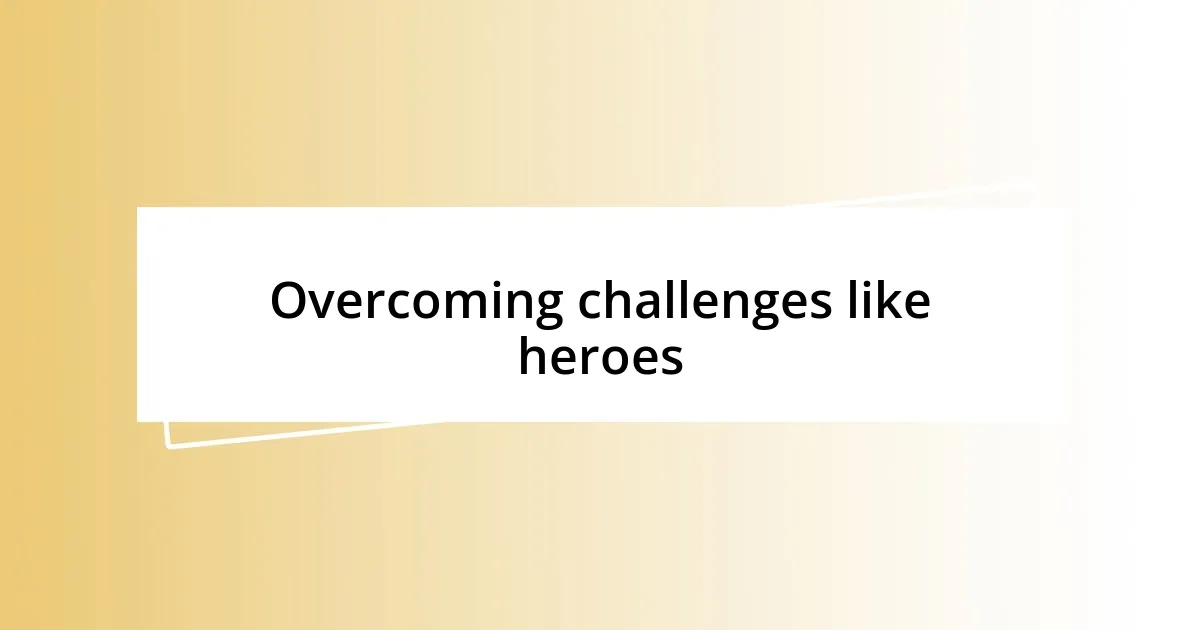
Overcoming challenges like heroes
When I think about overcoming challenges like heroes, I immediately recall a tough time in college when I was balancing demanding coursework and a part-time job. I felt like Frodo carrying the weight of the One Ring, uncertain if I’d make it to the end. But just like Frodo, I discovered that seeking support from friends can be incredibly powerful. It wasn’t just about surviving; it was about sharing burdens and ultimately rising to the occasion together.
There was a moment during my internship when I had to lead a team project that seemed destined for failure. Much like Harry Potter facing Voldemort, I felt the intimidating weight of expectations pressing down on me. I remember how my heart raced and doubt flooded in, but instead of retreating, I took a deep breath and rallied my team. This experience taught me that the act of confronting challenges can transform fear into determination—it’s about harnessing that fear as a catalyst for growth.
At times, I wonder if we all have a hero lurking within, waiting for the right moment to emerge. Reflecting on moments in my life where courage and resilience became necessary, I realize that the common thread is a decision to confront difficulties head-on. Whether it was standing up to a bully in school or navigating a broken friendship, embracing these challenges shaped who I am today. It makes me ask, how often do we let fear stop us from unlocking our inner hero? In my case, I’ve learned that embracing challenges not only reveals my strength but also inspires those around me to rise to their own heroic potential.
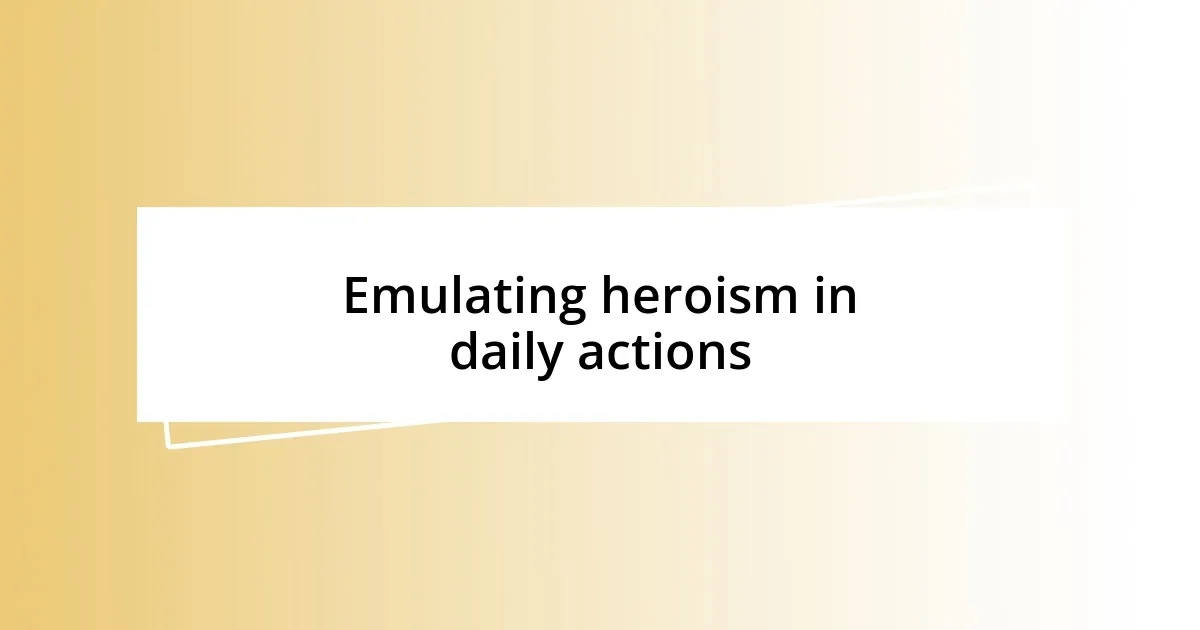
Emulating heroism in daily actions
Emulating heroism in daily actions requires a conscious effort to incorporate small acts of bravery into our everyday routines. I remember a time when I chose to help a stranger struggling with groceries on a busy sidewalk. In that moment, I felt a rush of warmth, realizing that even a simple gesture can make someone’s day a little brighter. It’s moments like these that remind me that heroism doesn’t always mean epic quests; it can be as simple as being kind and attentive to those around us.
Moreover, I’ve found that heroism shines through in the moments when I stand up for my values. Recently, I was in a discussion about a social issue that I’m passionate about, and I felt the tension rise as others expressed different opinions. Instead of shrinking back, I shared my perspective, drawing inspiration from heroes like Captain America, who always fights for what he believes is right. This confrontation reminded me that sometimes, being heroic means being brave enough to voice our values, encouraging others to reflect and engage—what a powerful way to ignite change!
In these little daily choices, I often ask myself, how can I be more intentional in emulating those heroic qualities? When I volunteer at a local shelter, I strive to bring the same compassion and dedication that characters like Wonder Woman display in their missions. These experiences not only impact the people I interact with but also enrich my own life. I feel a sense of purpose swell within me, illuminating the path of heroism as a continuous journey we can embark on each day.
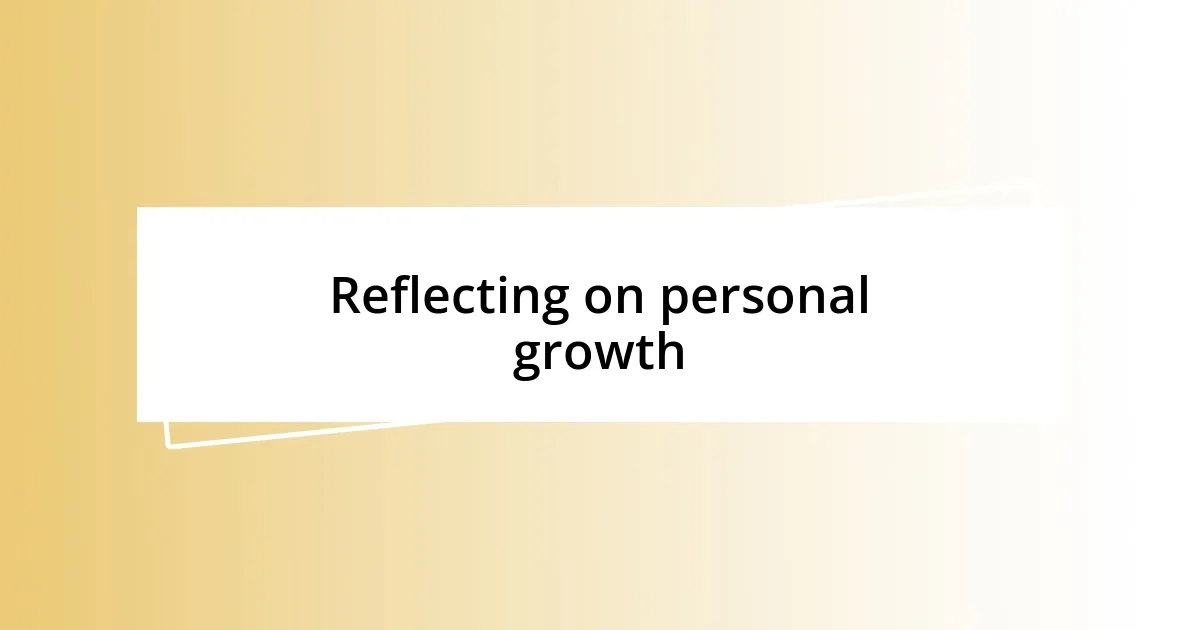
Reflecting on personal growth
Reflecting on personal growth often unveils the quiet moments when I learned the most about myself. One time, during a challenging group project in my final year of college, I initially faltered under pressure, feeling like I had lost my way. However, as I started to recognize the strengths of my teammates and embraced my role as a connector among us, I saw how we could support each other, evolving beyond personal limitations to achieve something much greater.
In those times of self-reflection, I find it fascinating how confronting vulnerabilities can ignite growth, much like the transformation seen in classic heroes. Take my experience volunteering at a community youth program; the first day, I was overwhelmed by my perceived inadequacies. Yet, as I shared silly stories and encouraged the kids to express themselves, I realized that my awkwardness turned into authentic connection. That serendipitous transition led me to understand that being a hero can mean simply being present and real with others.
Whenever I think of personal growth, I can’t help but inquire: What if every setback is just a stepping stone toward becoming a more authentic version of myself? I remember late nights filled with self-doubt while preparing for my first public speaking engagement. But stepping onto that stage, I felt an electric mix of fear and exhilaration, and with each word I uttered, I found pieces of strength I never knew I possessed. It was in that melding of vulnerability and courage that I realized growth isn’t just a destination—it’s a beautiful, messy journey worth every misstep.




